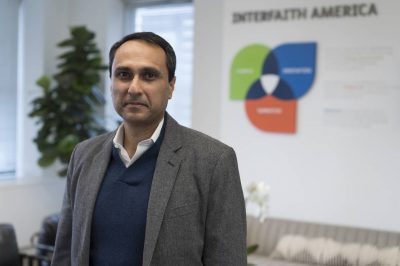Twenty years ago, Eboo Patel started interfaith work in his basement to bring people of different faiths together for dialogue and service projects.
Today, his work has grown significantly to become a nonprofit with a staff of 54, a budget of $14 million and programs on hundreds of college campuses.
His organization, formerly known as Interfaith Youth Core, was renamed as Interfaith America on Tuesday to reflect a broader goal, Chicago Tribune reported.
“We are an organization that builds bridges and says, ‘Diversity is not just the differences that you like,’” said Patel, 46.
“The only way to have a healthy, religiously diverse democracy is for people who disagree on some fundamental things to work together on other fundamental things, right? It’s a remarkable achievement in human history for people of diverse identities and divergent ideologies to build a nation together, and we think religion has an awful lot to do with that,” he said.
Patel is a noted Muslim community leader and speaker on issues of religious diversity, civic engagement, and the intersection of racial equality and interfaith cooperation.
Expanded Mission
The organization’s name change Tuesday at Georgetown University came in recognition of its expanded mission.
“As my Buddhist friends say, ‘Chop wood, carry water,’ right? There are no shortcuts,” Patel said of his organization’s rise.
“I’m really proud of how hard we have worked, program by program, staff person by staff person, student by student, faculty member by faculty member.”
Till now, Patel is still setting new goals, saying he wants the United States to fully embrace the contributions of all religions to the cultural fabric of the country.
“My vision is that we start calling the United States ‘Interfaith America,’ and not Judeo-Christian, and that becomes just commonplace in five or six years,” he said.
“‘Judeo-Christian’ did great work, but it doesn’t include atheists or Zoroastrians, it doesn’t include Muslims or Jains, it doesn’t include B’hais or Buddhists. And we have to. We have to. So a big part of the vision is a shift in paradigm. And then I want our civic American institutions to follow that shift in paradigm with actual activities.”
Interfaith America was founded in 2002 based on the idea that religious difference should serve as a bridge of cooperation rather than a barrier of division.
Since that time, Interfaith America has evolved from a small Chicago-based nonprofit to the nation’s premier interfaith organization.


